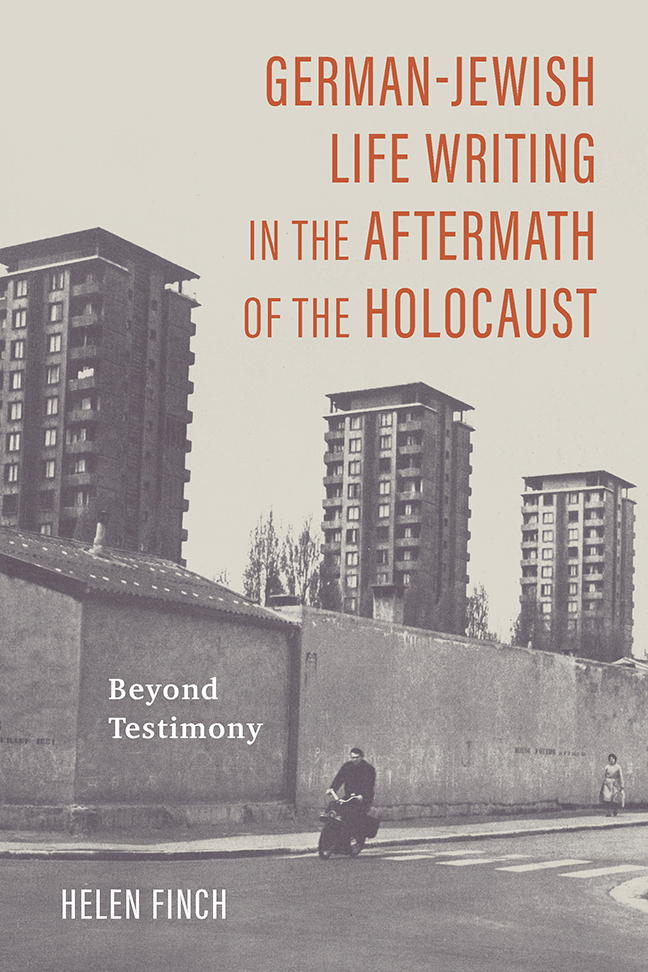Book contents
- Frontmatter
- Dedication
- Contents
- Acknowledgments
- List of Abbreviations
- Introduction
- 1 Modernist Marginalization in Exile: H. G. Adler in the 1950s and 1960s
- 2 Solidarity and Trauma between Austria and the GDR: Fred Wander from the 1960s to 2006
- 3 Transnational Transgression: Edgar Hilsenrath from 1980 to 2018
- 4 Feminist Rage: Ruth Klüger in the New Millennium
- Conclusion
- Bibliography
- Index
2 - Solidarity and Trauma between Austria and the GDR: Fred Wander from the 1960s to 2006
Published online by Cambridge University Press: 10 January 2024
- Frontmatter
- Dedication
- Contents
- Acknowledgments
- List of Abbreviations
- Introduction
- 1 Modernist Marginalization in Exile: H. G. Adler in the 1950s and 1960s
- 2 Solidarity and Trauma between Austria and the GDR: Fred Wander from the 1960s to 2006
- 3 Transnational Transgression: Edgar Hilsenrath from 1980 to 2018
- 4 Feminist Rage: Ruth Klüger in the New Millennium
- Conclusion
- Bibliography
- Index
Summary
Jemand sagte: “Ein Buch über die Konzentrationslager? Was soll es bewirken?” Und ein anderer sagte: “Sie leugnen die Wahrheit. Und drüben im Adenauerstaat fühlen sich die Nazis bestens aufgehoben und bestätigt. Sie werden die Wahrheit immer weiter leugnen!” Daß war das Thema, auf das wir immer wieder stoßen sollten: Was sollen wir schreiben? Und ist der sozialistische Realismus der geeignete Hebel, der Bohrer, um ein Loch in die Wand des Leugnens voranzutreiben? Kann man durch Literatur die Menschen verandern?
[Somebody said: “A book about the concentration camps? What is that supposed to achieve?” And another said “They deny the truth. And over there in the Adenauer state the Nazis feel in the safest possible hands and they feel validated. They will continue to deny the truth!” That was the issue that we always ran up against. What should we write? And is socialist realism the right lever, the drill to bore a hole in the wall of denial? Can literature change people?]
I open this chapter with a question raised by Austrian survivor Fred Wander (1917–2006) in both versions of his autobiography, the first published in 1996 as Das gute Leben: Erinnerungen (The Good Life: A Memoir), and the second, revised and with the longer title Das gute Leben oder Von der Fröhlichkeit im Schrecken (The Good Life or On Joy in Horror), published in 2006. This question underlies all literary testimony to the Holocaust. “A book about concentration camps? What use is that?” Wander's assertion that “they would always run up against this question” might seem to suggest that for writers of the Holocaust this question is in many ways ahistorical. Such a reading of Wander's question would seem to return the Holocaust to the realm of the metaphysical, a sacralized tragedy that raises existential, rather than political, questions. These questions preoccupied the Austrian-Jewish survivor Wander for his entire writing life, in multiple contexts. Wander was born as Fritz Rosenblatt in Austria in 1917, fled from the Anschluss to France in 1938, was captured and deported to Auschwitz and Buchenwald among many other camps, and subsequently chose to spend almost thirty years in the German Democratic Republic before returning to Austria in 1983 (DgLa, 99; DgLb, 127).
- Type
- Chapter
- Information
- German-Jewish Life Writing in the Aftermath of the HolocaustBeyond Testimony, pp. 65 - 107Publisher: Boydell & BrewerPrint publication year: 2023

